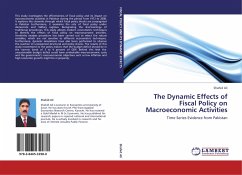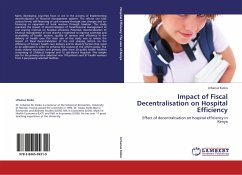
The Dynamic Effects of Fiscal Policy on Macroeconomic Activities
Time Series Evidence from Pakistan
Versandkostenfrei!
Versandfertig in 6-10 Tagen
32,99 €
inkl. MwSt.

PAYBACK Punkte
16 °P sammeln!
This study investigates the effectiveness of fiscal policy and its impact on macroeconomic activities in Pakistan during the period from 1972 to 2008. It explores the channels through which fiscal policy shocks are propagated in Pakistan Furthermore, it examines the role of fiscal policy under democratic and military regimes. Recognizing the shortcomings of traditional procedures, this study adopts modern econometric techniques to identify the effects of fiscal policy on macroeconomic activities. Sensitivity analysis procedure has been carried out to select the robust variables, which are not ...
This study investigates the effectiveness of fiscal policy and its impact on macroeconomic activities in Pakistan during the period from 1972 to 2008. It explores the channels through which fiscal policy shocks are propagated in Pakistan Furthermore, it examines the role of fiscal policy under democratic and military regimes. Recognizing the shortcomings of traditional procedures, this study adopts modern econometric techniques to identify the effects of fiscal policy on macroeconomic activities. Sensitivity analysis procedure has been carried out to select the robust variables, which are not sensitive to different econometric techniques. Furthermore, dynamic simulations have also been performed to observe the reaction of unexpected structural and policy shocks. The results of this study recommend to the policy makers that the budget deficit should be in the narrow band of 3 to 4 percent of GDP. Behind this limit the unsustainable budget deficit could have undesirable macroeconomic costs and the government s macroeconomic objectives such as low inflation and high economic growth might be in jeopardy.












